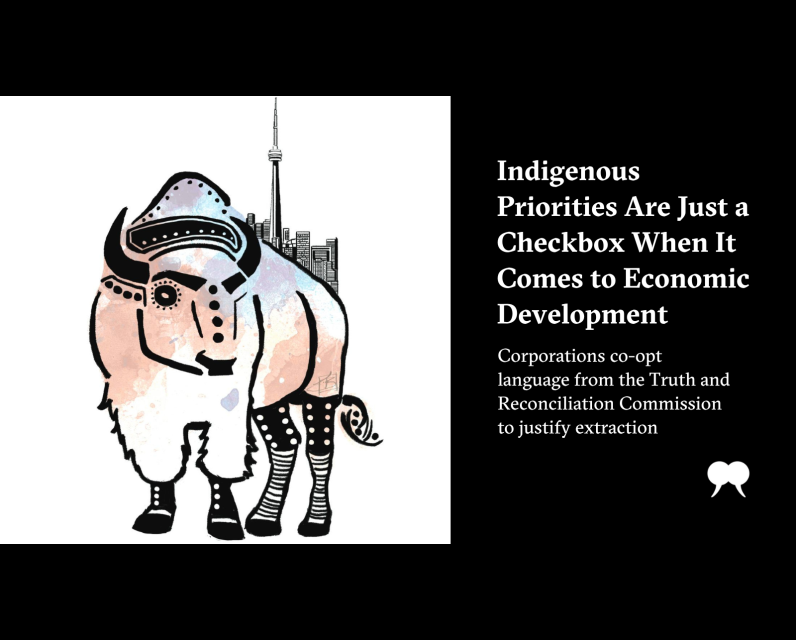Indigenous Priorities Are Just a Checkbox When It Comes to Economic Development

Is it possible for Indigenous nations to define their own priorities within the very same economy built on their oppression and exclusion? In the decade since the Truth and Reconciliation Commission released its Calls to Action, the Canadian government has failed to shift the foundations of its economic system in a way that would truly make space for Indigenous self-determination. Instead, Indigenous people are told to be grateful that they have a seat at the table, with the menu already set.
The majority of the Calls to Action are not written for corporations. But call ninety-two highlights the need for fair access to employment, training, and education in accordance with the United Nations Declaration on the Rights of Indigenous Peoples, and for free, prior, and informed consent before proceeding with economic development projects. It must also be interpreted in light of the demands on the government to provide culturally relevant health care, fair access to education, and the revival of Indigenous legal systems.
-
Read more from our Truth and Reconciliation series:
- Intro
- Truth
- Child Welfare
- Land
- Gender
- Media
Rather than implementing these calls through strong policy, federal and provincial governments have outsourced a simple checklist of Indigenous partnership to industry. In the absence of land back, redress, and systemic change, we have corporations cherry-picking language from the commission in order to legitimize resource extraction. In recent years, governments and industry have increasingly pointed to call ninety-two to justify “economic reconciliation,” a term that barely appears in the TRC’s Final Report and has since been co-opted to green-light resource extraction projects under the guise of partnership. It has been reframed as a means of enabling pipelines, mines, and corporate access to Indigenous lands, rather than representing the commission’s intention or the survivors’ vision.
This is an active political decision made by governments, rather than passive neglect. Governments can preserve the appearance of progress without ceding power by assigning accountability to industry. It can be easier, and cheaper, to allow corporations to make private deals and create short-term jobs rather than have the government confront land restitution, Indigenous governance, or the full implications of Indigenous sovereignty. In this arrangement, reconciliation becomes a public relations strategy, delivered by corporations, and keeps the status quo intact.
Since the TRC, it is clear that in the eyes of the government, Indigenous people do not have the right to define their own priorities if they run counter to the government’s desire to extract land and labour. The Wet’suwet’en hereditary chiefs and land defenders spent years resisting the Coastal GasLink pipeline on their unceded territory, only to be met with militarized Royal Canadian Mounted Police raids and criminalization. In Ontario, Asubpeeschoseewagong Anishinabek First Nation (Grassy Narrows) has spent decades mired in a legal and political struggle for justice after mercury poisoning devastated its community and surrounding area, all while fighting off logging operations. The Blueberry River First Nations had to take the province of British Columbia to court to finally have their treaty rights recognized after years of cumulative industrial development.
There are no meaningful avenues for Indigenous people to assert rights on their own lands aside from front-line resistance or protracted, costly legal battles—which inevitably result in their being characterized as opposed to economic progress.
Far too often, people hear about economic development and think of industry, factories, big companies, and assimilation into the Canadian extraction economy. Another way forward exists. Across this land, nations are bringing local food systems back to life through hunting, fishing, farming, and careful preservation that feed people and nurture the soil. Indigenous communities are now backing renewable energy projects that cut diesel reliance, keep energy ownership local, and let revenue stay within the community.
Language immersion schools, cultural tourism, and artist-run spaces do double duty by breathing life into identity and creating steady jobs. Midwifery programs, land-based healing, and community care places put health and wellness ahead of profit.
These are not side projects. These efforts form a circular, regenerative economy where value is shared through kinship, rather than pulled away and sold. If governments funded these initiatives at even a fraction of what they pour into resource extraction, or celebrated them with the same fanfare they give to liquified natural gas ground breakings and ribbon cuttings, we would be miles closer to real economic reconciliation.
Reconciliation is a duty, not a project to be left to the private sector, not a branding opportunity, and not a line item in a corporate social responsibility report. Chronic funding gaps and a lack of political imagination mean that Indigenous-led visions for economic development, rooted in land stewardship, language, care, and culture, are often dismissed or defunded. This leaves communities stuck with the choice to participate in extractive economies on settler terms or to be excluded entirely. Until Indigenous priorities are more than a checkbox, reconciliation will remain unfulfilled.
The post Indigenous Priorities Are Just a Checkbox When It Comes to Economic Development first appeared on The Walrus.
Comments
Be the first to comment